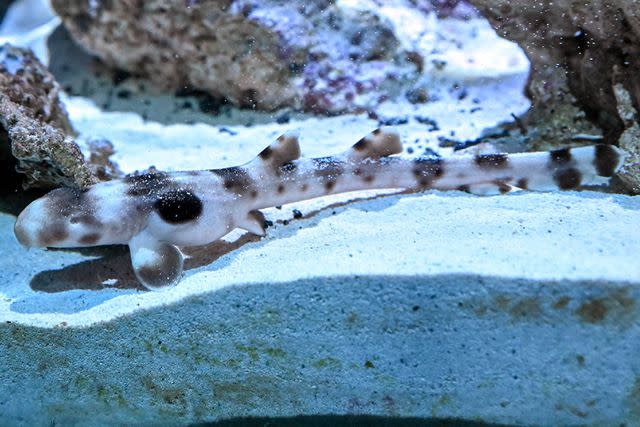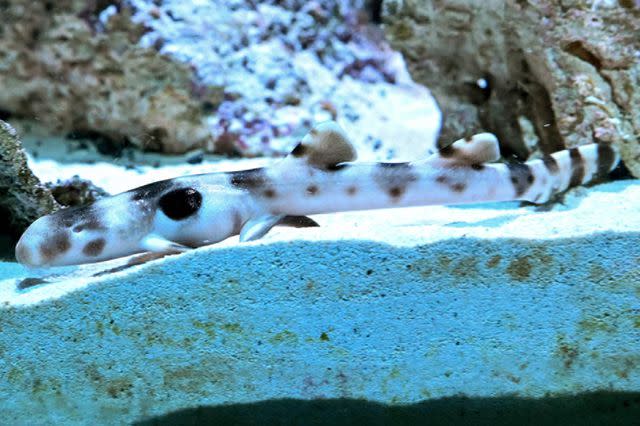Shark Surprises Chicago Zoo by Hatching Pup Despite Having No Contact with Males
An epaulette shark pup hatched in August at the Brookfield Zoo, even though its mother lived alone in her habitat with no interaction with potential mates

Jim Schulz/CZS-Brookfield Zoo
An epualette shark pup that hatched on Aug. 23 at Brookfield Zoo in ChicagoHistory has been made at a Chicago zoo after a resident shark reproduced despite being housed in a habitat on her own.
The mom, a female epaulette shark, has lived at the Brookfield Zoo, located outside Chicago, since 2019. In August, one of her eggs hatched into a pup — making history as the second recorded instance of the species reproducing asexually in the U.S., according to a November press release from the zoo sharing the shocking news.
Since 2022, the shark has laid eggs monthly that were thought to be infertile, according to the zoo. However, on Aug. 23, one of the eggs hatched following a five-month incubation period, having been produced through a process called parthenogenesis, which is when an embryo develops from an unfertilized egg cell.
Its mother has not been housed with a male of her species since arriving at the zoo four years ago and has only recently reached sexual maturity, per the release.
Related: Rare Clouded Leopard Kitten Born at Oklahoma City Zoo
Following the pup's birth, the baby shark was closely monitored by zoo staff and is now on display in one of Brookfield Zoo's habitats. It's currently between five to six inches long but will likely reach up to 3 feet when fully grown, per the zoo.
The epaulette shark is "mostly nocturnal" and typically found in warm, shallow waters around New Guinea and Australia.

Jim Schulz/CZS-Brookfield Zoo
An epaulette shark pup hatched from asexual reproduction at the Brookfield Zoo in AugustThe release also shared that the first recorded epaulette shark birth via parthenogenesis in the U.S. occurred at the New England Aquarium, where the female shark now housed at the Brookfield Zoo was born.
Related: Shock Twist at Columbus Zoo as 'Male' Gorilla Gives Birth to Surprise Baby Girl
"We are happy to report that our epaulette pup has been eating well on her diet of finely chopped capelin, minced squid tentacles, and other finely chopped seafood. Our colleagues at New England Aquarium have been a great resource as shark pups produced parthenogenetically can be very delicate," Mike Masellis, one of the zoo's lead animal care specialists, said in the release. "We are looking forward to guests being able to see the pup."

Jim Schulz/CZS-Brookfield Zoo
An epaulette shark pup was hatched at Brookfield Zoo in August, making history as the second egg to hatch despite no fertilization from a maleNever miss a story — sign up for PEOPLE's free daily newsletter to stay up-to-date on the best of what PEOPLE has to offer, from celebrity news to compelling human interest stories.
Parthenogenesis — a process by which an animal asexually reproduces — is "less" common of an occurrence in complex vertebrates like sharks, according to the zoo, while it's a "natural occurrence" in some others.
The University of Maryland, Baltimore County, cites certain species of lizards and crustaceans are more inclined to asexually reproduce through parthenogenesis compared to sharks and other more complex vertebrates.
For more People news, make sure to sign up for our newsletter!
Read the original article on People.

 Yahoo News
Yahoo News 
